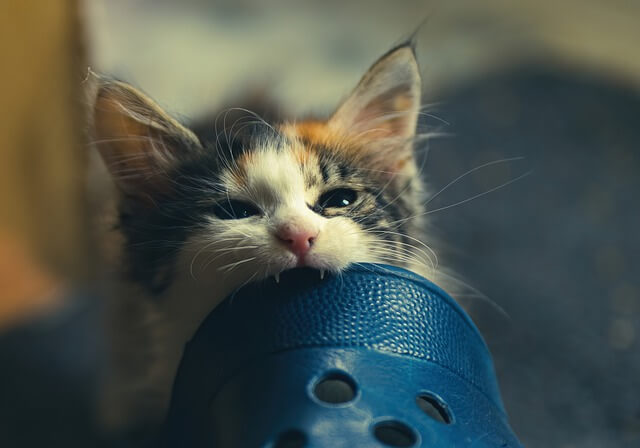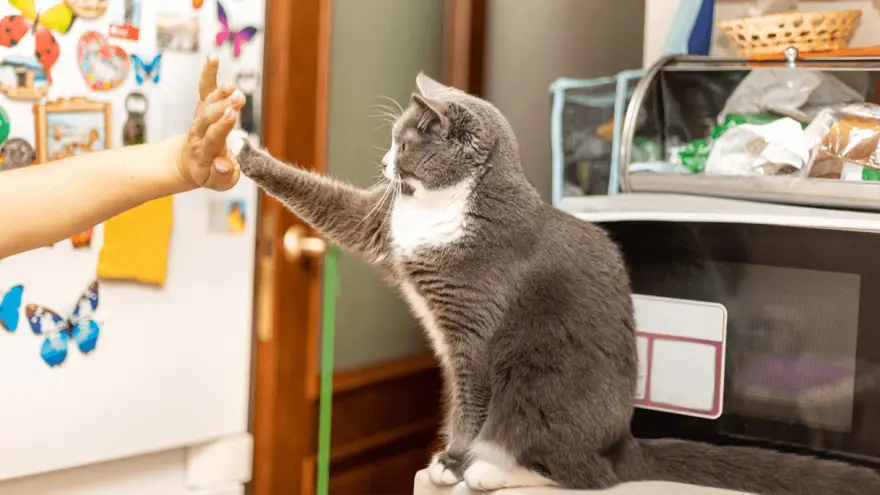How To Train Your Cat: Expert Tips & Tricks
24.04.2022.
Cats are not dogs - that's something all cat owners (and dog owners) are aware of. However, did you know that you can train a cat? The learning process of cats and dogs might be different, but there are a lot of similarities, and it might be easier than you think. If you're a new cat owner and you're wondering, "How can I train my cat?" here are the most important things you should know about cat training.
Intro to cat training
Teaching your cat to correlate good behavior with a reward is the essence of cat training. As a result, you'll be able to help them change their ways and lead a better, healthier life together.
Cats, like dogs, can be taught to follow directions and perform tricks, despite the fact that they don't naturally cooperate with humans. Additionally, cat training can offer cats both physical and mental stimulation, which can aid in the reduction of problematic feline behaviors such as aggression and destructiveness.
RELATED: Cat Repellents: How To Keep Cats Away From Restricted Areas
In addition to teaching you how to read your cat's body language, consistent cat training can also help you understand what they're trying to express (including the many ways they demonstrate their affection for you!) For those who aren't sure whether or not they're ready for a cat, consider the effectiveness of cat training.

Before you begin training your cat, here are some things to consider.
Prepare loads of treats
Cats, for the most part, are unmotivated. Cats, unlike dogs, aren't as enthusiastic about learning until they get something in return. Preparation is critical if you want to get the most out of your training sessions with your cat. The best way to motivate your cat is by offering them loads of delicious treats as rewards.
Know when training is effective
Your cat will benefit from training sessions because their everyday lives revolve around hunting (play), feeding, grooming, and resting. After a nap, your cat will be play-ready and more likely to focus on training if you try it shortly after they wake up. Additionally, they'll likely be hungry, which will make them work even harder for sweets.
RELATED: 5 Tips On How To Bathe A Cat Safely
Training sessions should be kept short
Cats' attention spans are short. A 15-minute training session is just the right amount of time to get the job done while also keeping your cat engaged. Remember that growth, not perfection, is the aim!
Remove distractions
Distracted cats are unable to concentrate. To get the most out of your training, find an area free of other pets and family members. The training session will be a waste of time if your kitten is distracted by any external stimuli.

Consistently follow your cues
Use the same signals (hand gestures, for example) or cues to avoid any misunderstandings. Consistency can be achieved by ensuring that all members of the family are aware of the appropriate signs and cues.
One thing at a time
Teaching a cat to do numerous things at once can cause them to become overwhelmed. To go to the next level, you should wait until your cat has mastered the first.
RELATED: How Often Should I Take My Cat to the Vet?
Repeat
The more times your cat does something, the more it becomes second nature to it. Make sure to practice the skill outside of a training session to ensure that your cat doesn't forget it.
Encouragement is key
Instead of focusing on behaviors you don't want to see, focus on what behavior you want to encourage. The only thing that will happen if you punish your cat for bad behavior is that your cat will become afraid of you.

Patience
It takes time to develop new behaviors or resolve behavioral issues. Be patient with your cat as it learns a new ability; they're more than capable and extremely smart.
What to teach your cat?
If you're just starting to learn about cat training and you're not entirely sure where to begin or what the skills your cat can learn are considered essential, here are a few basic things all cat owners should teach their cats.
Toilet training
It takes time and effort to potty train a cat, but consider the advantages: You'll save money and have a cleaner home. Start with a litter box near the bathroom. Then, as you move closer to the top of the seat, raise the cat's perch higher and higher. A unique litter box that fits inside the toilet can be used once your pet is used to using one on top of the toilet. Spills are inevitable when you use the flushable litter. To help your cat adapt to life without a litter box, gradually reduce the amount of litter you use. Try one of these self-cleaning litter boxes if you don't like cleaning up cat poop.
RELATED: Indoor Vs. Outdoor Cats: Which is Better?
Come on command
Cats can easily be taught to follow a voice command and come to you. In the event that your cat darts out of the house without warning, you can use this skill to bring it back in. Make a unique noise prior to feeding—before opening a bag or can—such as loudly calling your cat or clicking your tongue—this is the first stage in training a cat.
When your pet hears that sound, it will begin to associate it with a reward (food) and will eventually start to come toward you. Encourage this behavior at other times of the day. Begin by walking only a few steps away from your starting point. Reward your cat with a tasty treat after you've made a lot of noise and used your clicker to attract them. Call the cat from a greater distance over time. It is recommended that you perform up to 20 repetitions of the desired behavior in no more than two five-minute "cat training sessions" every day.
No biting
It's critical to pinpoint exactly when and why your cat bites in the first place when completing this part of cat training. Does it lash out at you for invading their space? The sooner you stop playing with your cat when they start biting and scratching you, the better off both of you will be. Keep your distance from your pet and stop whatever you're doing. If you stick to this strategy, they'll soon discover that if they're too rough with you, you won't play. Let them know that you're aware of their limits if they're lashing out at you when you handle them too much.

The lack of activity can also lead to lashing out. This can be remedied by giving your kitten more opportunities to exercise their natural predatory tendencies. Ensure your cat has a lot of things to play with, including things they can throw, chase, and catch. Toys like "fishing" toys allow you and your pet to take part in the hunt together.
RELATED: Expert Opinion - Why Do Cats Lick Me?
No furniture scratching
If your beloved feline is scratching your furniture, it may be because they require some scratching themselves. Keep their claws in shape by providing them with a scratching post. Whenever you notice your kitty engaging in inappropriate behavior, use a loud, unusual sound to divert their attention away from it. It will make them aware that what they're doing is wrong, but they won't be alarmed. It is crucial you always employ the same tone. However, don't declaw your cat. This is not going to help and, in fact, could make things far worse.
Conclusion
Harsh training methods have little effect on cats, and they don't learn anything from them. However, these strategies may be able to stop your cat from engaging in a specific activity while you're in the vicinity of them. Still, they won't completely prevent the behavior from occurring. The mere fact that you're here will put the cat on edge, making them frightened of your closeness. That's why teaching your pet to respond positively to praise and treats is so critical.
Cats communicate by their actions, particularly the actions we don't want to see from them. Punitive or behavior-decreasing methods simply will cause your cat to withdraw and prevent them from communicating with you. Instead of focusing on the things you don't want, focus on the things you do. If you follow our advice, it won't take long for your cat to blossom into an excellent roommate and a pleasant companion.
World Cat Finder Team




Share